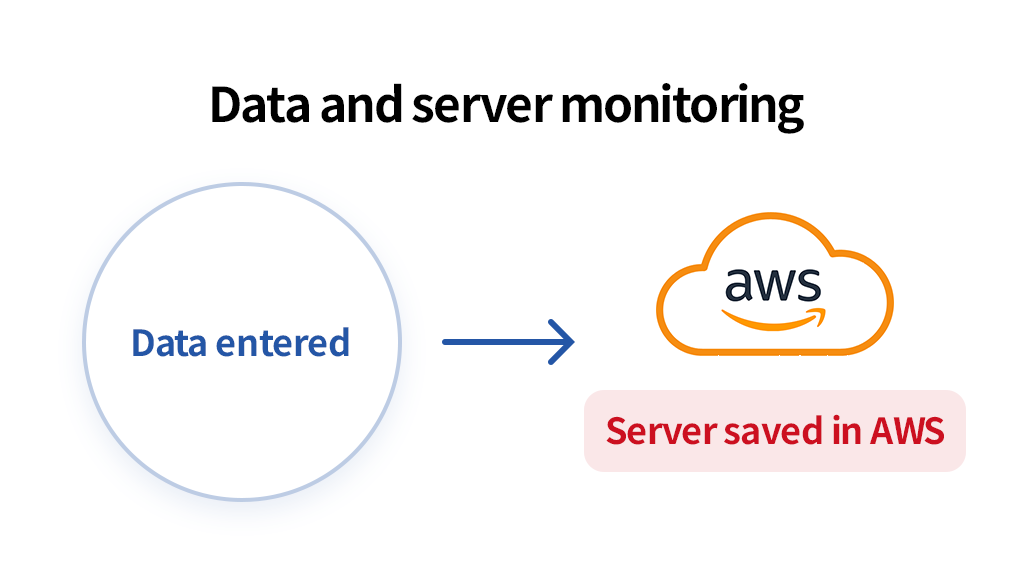Security Policy
ECOUNT acquired the International Security Certification ISO27001.
All servers are stored in Amazon Web Service (AWS), the world's leading cloud provider.
Acquisition of ISO 27001
- ISO 27001 is an international information security standard established by the International Organization for Standardization (ISO),
which assesses a company’s security capabilities based on 114 criteria.
ECOUNT continuously acquires and renews security
certifications through the following security systems.
1. Internal and External Security Audits
- We conduct annual audits by external security specialists to review our internal security processes.
- System vulnerabilities are identified and addressed through penetration testing.
- Internally, a Chief Information Security Officer is appointed to establish and operate management plans.
2. Institutionalized Security Inspections and Training for Employees
- Daily and monthly security inspections are conducted to check for customer data storage on employee PCs, security seal status, and unauthorized program installations.
- All employees sign a security pledge before commencing work and complete annual information security training.
- Security levels are applied differently for each employee, and unauthorized access to information is strictly blocked.
- When employees are transferred, access rights to information are revoked as part of our personnel security management procedures.
- Antivirus programs on employee PCs are managed to prevent information leakage caused by malware.
3. Encryption of Customer Information
- Data entered by customers into ECOUNT is transmitted using encrypted communication.
- Critical personal information such as resident registration numbers, account numbers, and card numbers is encrypted using algorithms before being stored on the server.
- Encryption keys are stored separately in locations inaccessible from outside, preventing information leakage.
4. Systematic Management of Information Assets and Systems
- ECOUNT manages customers’ information assets by monitoring system operations in real time.
- Information assets are classified by importance, and security levels are applied accordingly for effective data management.
- We have systems in place to manage potential risks such as information breaches and service disruptions.
- When risks to information assets are identified through inspections, system improvements are made to enhance stability.
5. Information Access Control
- ECOUNT records all access to information for tracking and management purposes.
- Security professionals monitor for information breaches in real time and block abnormal access attempts.
- Access control systems and CCTV are installed in all offices and server rooms to prevent unauthorized entry.
- Security systems such as firewalls are used to minimize and manage the IPs that can access data.
6. Data Backup and System Upgrades
- Regular backups are performed to prevent the loss of valuable customer data due to accidents or errors.
- Data recovery plans are established and recovery drills are conducted to prepare for emergencies.
- Monthly system inspections are conducted, and security patches are applied when vulnerabilities are found.
- System changes such as program upgrades are carried out safely through thorough analysis by experts.
7. Establishment of Disaster Recovery Systems
- ECOUNT has established disaster recovery systems to ensure service continuity in the event of a disaster.
- Disaster recovery drills are conducted to verify the effectiveness of data recovery plans.
Server Stored in Amazon
Web Services (AWS)
- ECOUNT stores its servers on AWS, which
boasts the highest level of security in the world. - By utilizing AWS’s server security systems,
we are protected from hacking attempts such as DDoS attacks. - ECOUNT’s security experts monitor servers and
data in real time to block potential threats.

Users Can Configure
Security Settings Directly
- Users can directly allow or block logins from
specific IP addresses. - Program access time limits can be set for each ID.
- Two-factor authentication can be enabled to
strengthen identity verification during login. - Password complexity and change intervals
can be adjusted, making security management
by ID convenient.


 ISO 27001
ISO 27001